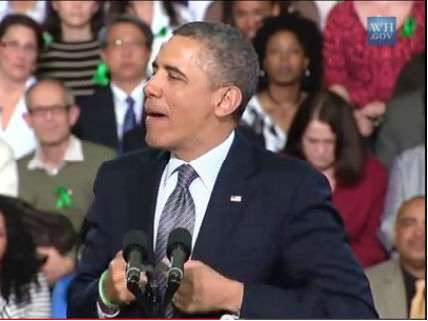Obama Responds to His Gun Control Defeat With Self-Righteous Solipsism

"There are good people on both sides of this thing," President Obama said in a gun control speech a couple of weeks ago, "but we have to be able to put ourselves in the other person's shoes." He worried that "both sides of the debate sometimes don't listen to each other" and wondered, "How do you build trust?" Not this way:
There were no coherent arguments as to why we wouldn't do this. It came down to politics—the worry that that vocal minority of gun owners would come after them in future elections….They caved to pressure, and they started looking for an excuse—any excuse—to vote no….This was a pretty shameful day for Washington.
That is how Obama explained the Senate's refusal to approve the gun control measures he supports. According to the president, no one honestly questioned the merits of his proposals; the opposition all "came down to politics," meaning a desperate desire to retain power. His opponents not only failed to make a convincing case, he says; they offered "no coherent arguments" at all. Since Obama's case for gun control consisted mainly of invoking dead children and grieving parents, that charge displays an astonishing lack of self-awareness. Here is how Obama responds to critics, such as Sen. Rand Paul (R-Ky.), who fault him for using victims of gun violence as props:
Are they serious? Do we really think that thousands of families whose lives have been shattered by gun violence don't have a right to weigh in on this issue? Do we think their emotions, their loss, is not relevant to this debate?
Of course they have a right to speak their minds. But no, their emotions are not relevant when it comes to empirical questions such as the impact of background checks, "assault weapon" bans, and limits on magazines. Their pain tells us nothing about the effectiveness or constitutionality of such measures. To the contrary, it obscures those issues with an impenetrable emotional fog.
Obama does a fine job of empathizing with the parents of Adam Lanza's victims. But that is something any decent human being should be able to manage. Where he has trouble, despite his lip service to the idea of putting himself in the other guy's shoes, is in empathizing with his opponents. He not only says they are wrong, which is to be expected. He refuses to concede that people who disagree with him about gun control are acting in good faith, based on what they believe to be sound reasons—that they, like him, are doing what they think is right. His self-righteous solipsism is striking even for a politician.


Show Comments (488)